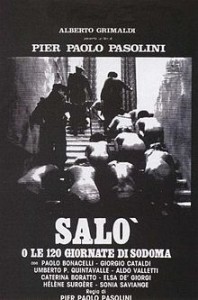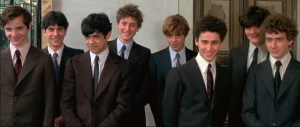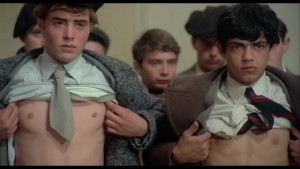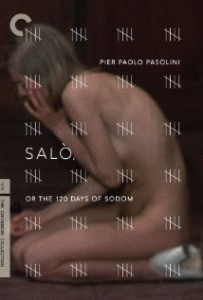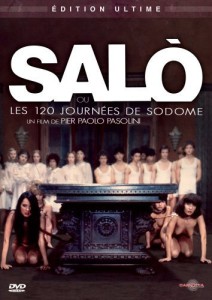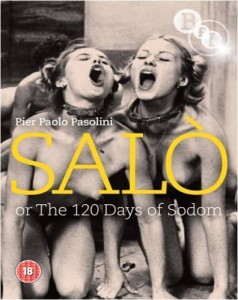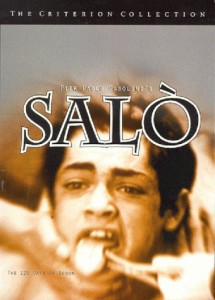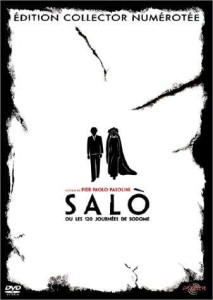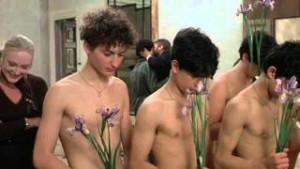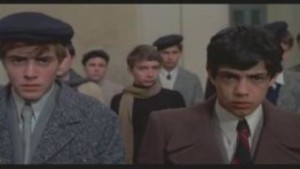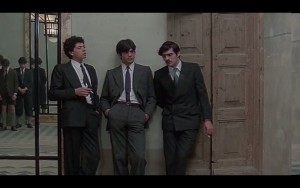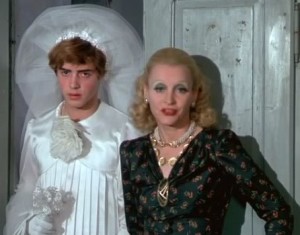Salò, or the 120 Days of Sodom *** (1975, Paolo Bonacelli, Giorgio Cataldi, Umberto Paolo Quintavalle, Franco Merli, Sergio Fascetti) – Classic Movie Review 3199
Director Pier Paolo Pasolini’s infamous, highly controversial, problematic final film, based on the Marquis de Sade’s novel The 120 Days of Sodom, was made shortly before his murder on 2 November 1975, aged 53, and released soon afterwards. It is an extremely challenging, disturbing and depressing, sexually explicit parable of fascism, filmed with apparent commitment and relish by the director. It was advertised as ‘A disturbing motion picture for mature audiences who are prepared to view it.’
It is exceptionally hard to watch in either full or cut versions, though the removing of the excessive violence to make it ‘acceptable’ simply makes it a pornographic S & M fantasy, which is surely not what Pasolini or screen-writer Sergio Citti intended at all. In the UK, a cut version prepared under the supervision of British Board of Film Classification secretary James Ferman was screened under cinema club conditions for several years without formal certification.
Once again Pasolini uses Ennio Morricone for his score, a jazz-based one. The actors are Paolo Bonacelli as The Duke, Giorgio Cataldi as The Bishop, Umberto Paolo Quintavalle as The Magistrate and Aldo Valletti as The President, with Caterina Boratto, Elsa De Giorgi, Hélène Surgère, Laura Betti and Sonia Saviange.
Salò transposes the setting of de Sade’s book from 18th-century France to the last days of Benito Mussolini’s regime in the Republic of Salò. So the film is set in Salò, a town at the foot of Lake Garda in Northern Italy where Mussolini’s Fascist government, ousted from Rome that was a puppet state of Nazi Germany, had its capital from 1943 until it fell from power in 1945. Salò is a potent reminder of the horrors of Mussolini and his regime for Italians. It was also relevant for Pasolini as his brother was killed there.
Controversy aside, Salò is a serious art movie work, exploring the themes of political corruption, abuse of power, sadism, perversion, sexuality and Fascism. The film focuses on four wealthy, corrupt Fascist libertines (Paolo Bonacelli as The Duke, Giorgio Cataldi as The Bishop, Umberto Paolo Quintavalle as The Magistrate and Aldo Valletti as The President) after the fall of Mussolini’s Italy in July 1943. The libertines kidnap 18 teenagers and subject them to 120 days of extreme violence, sadism and sexual and mental torture.
Salò’s complex, challenging script by Sergio Citti, Pasolini and Pupi Avati also refers to and discusses Friedrich Nietzsche’s 1887 book On the Genealogy of Morality, Ezra Pound’s poem The Cantos and Marcel Proust’s novel sequence In Search of Lost Time. The story is divided into four segments, an Antinferno (Hell’s vestibule) and three Gironi (Hell’s circles), the Circle of Manias, the Circle of Shit and the Circle of Blood, in a structure referring to and inspired by Dante’s Divine Comedy: the Anteinferno.
Also in the cast are Claudio Cicchetti, Umberto Chessari, Franco Merli, Gaspare di Jenno, Sergio Fascetti, Antonio Orlando, Lamberto Book and Bruno Musso.
The film was rejected by the British Board of Film Classification in 1976, effectively banning it in the UK. However, the uncertificated complete film was shown in a Soho club cinema in Old Compton Street in London until after a few days the police raided the cinema, confiscated the film and even seized the projector.
For 25 years it was unavailable at all in the UK, though in Italy you could buy it uncut on video. Sky TV’s attempt to televise the full uncut version in 1991 was vetoed by the British Board of Film Classification. But it was finally passed with an 18 certificate by the BBFC in 2000. However, even now, the film remains banned in some countries.
It was intended as the first part of Pasolini’s Trilogy of Death after his Trilogy of Life (The Decameron in 1971, The Canterbury Tales in 1972 and Arabian Nights in 1974) but the other two parts were never filmed.
It’s taken awhile, but Pasolini has finally come to be valued as a major figure in Italian literature and cinema.
Pasolini discovered Franco Merli as the star of his Arabian Nights (1974) and employed him again in Salò, which made his image famous, as one of the film’s most publicised images is a close-up of his face as his tongue is cut out. Today he lives in Rome, works in a bank and has two sons.
© Derek Winnert 2015 Classic Movie Review 3199
Check out more reviews on http://derekwinnert.com

